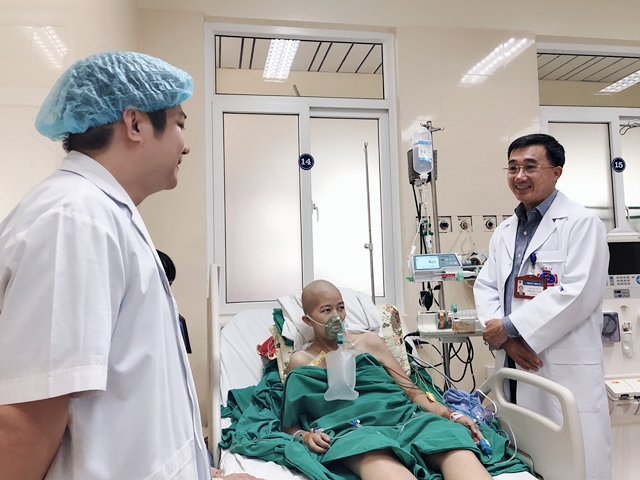 Society
Society

On the morning of May 22, Nguyễn Thị Liên, 28, sat on her bed at K Hospital in Hà Nội surrounded by medical equipment awaiting surgery that afternoon.

|
| Liên had to sit up during the C-section process. — Photo Nguyễn Khánh/tuoitre.vn |
HÀ NỘI — On the morning of May 22, Nguyễn Thị Liên, 28, sat on her bed at K Hospital in Hà Nội surrounded by medical equipment awaiting surgery that afternoon.
Looking pale in green hospital clothes, she breathed heavily. Doctors were going to conduct a C-section to save her 31-week-old baby.
When she was eight weeks pregnant, she found lumps on her breast. Thinking it was a normal sign of pregnancy, Liên didn’t go for a check up.
As more lumps started to appear on her body, Liên became constantly tired and started coughing more and more. When she was 22 weeks pregnant, doctors at K hospital told her something all women fear: she had last-stage breast cancer.
The choice she was given was stark — either terminate the pregnancy to start her cancer treatment and increase her chance of survival, or carry her son to term and battle the excruciating disease with minimal treatment.
Without thinking twice, Liên said she wanted to keep the baby.
After that, Liên was given two cycles of chemotherapy. Six weeks later, she developed more breathing problems. Liên was hospitalised in intensive care – where she was only able to sit up all the time. Her baby was getting so big she wouldn’t have been able to breath if she lay down.
She was in constant pain and her immune system was falling significantly day by day. Hùng, her husband, got her a small laptop table so she can put it on her bed and rest her head when she was too tired.
She said she wanted to see her baby just once to make the suffering worth it.
When she reached 31 weeks old, the doctors at K Hospital said Liên’s body couldn’t take it anymore. A group of doctors from the National Hospital of Obstetrics and Gynecology were asked to help with the C-section.
The surgery
Liên was taken to the operating room at 3.30pm. She was given an epidural, but she couldn’t lie down, and she had to stay awake during the whole process.
Doctors feared she might not wake up from an anesthetic.
Half an hour later, a baby boy was born. He was smaller than other newborns, but seemed to be healthy.
He was named "Bình An" - which means "serene".
“How much does he weigh?” – Liên said in fainted breath, still trying to keep her eyes open.
The doctors couldn’t answer because they didn't have scales, so all they could tell was the baby was fine.
Nurses immediately carried the baby boy to a waiting ambulance and ferried him to the National Hospital of Obstetrics and Gynecology for special care.
Hùng, the father, who was waiting with red eyes outside the operating room, ran after the nurse to get a glimpse of his son. He kept on running until the group reached the ambulance.
Tears were still on his eyes when he came back to see his wife. They kept coming when Hùng tenderly touched Liên’s feet as she was taken to ICU. And they kept coming when Liên slowly fell asleep and was put on a ventilator.
Hùng met Liên in 2015 and they married the same year. Theirs was a whirlwind romance – meeting just a few times before Hùng simply asked Liên to marry him. They had their first child in 2016 – Liên recovered quite quickly that time.
“She could go to work in the fields and sell vegetables in the market just a few months after she gave birth to our first daughter,” Hùng said.
Two days after the surgery, Hùng was able to visit the baby boy at the National Hospital of Obstetrics and Gynecology. He couldn’t help crying again, but felt happy that the boy was doing well.
Liên, however, was not doing so well. On May 24, she fell unconscious.
Doctors at K Hospital asked their colleagues at the National Hospital of Obstetrics and Gynecology for some clips of the baby boy to show to Liên when she woke up.
“Was it a miracle? I don’t know – but Liên woke up on the afternoon of May 28, and she was able to see her son on the phone,” said Doctor Trần Danh Cường, director of the National Hospital of Obstetrics and Gynecology, who also conducted the C-section.
Hopefully, she will improve and be able to see her baby this week.
He said it was one of the most complicated procedures he had performed in his career.
“There was a time I thought she only had days to live,” he said.
“I’ve seen so many brave mothers. If she'd terminated her pregnancy when the cancer was discovered, her chances of surviving would have been much higher, but she gave everything for her baby,” Cường said.
"If we were able to conduct early cancer screenings for all women, then we would have less late-stage cancers," he said.
Hopefully, the hospital would complete a cancer screening centre next year so there won’t be more complicated cases like Liên’s, Cường said. — VNS




